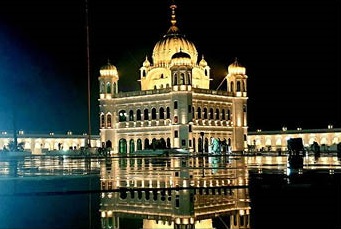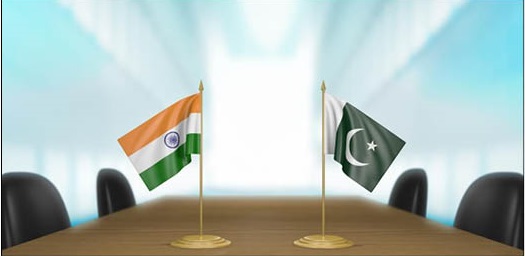Being the devil’s advocate is not a preferred job. So is the case for those who stand for congenial relations between India and Pakistan. Peace is apparently a shunned word in the subcontinent, as politics of hate and prejudice rule the roost. This is why both the neighbours and their respective establishments feel themselves at ease in living with the conflict syndrome. Any jibe for normalizing relations is, thus, seen as an act of treason and anti-state activity.
Now let’s look at the pestering side of ground reality in India-Pakistan ties. Kashmir is and has been the only cardinal dispute. It is in need of a solution. The Kashmir imbroglio impacts millions of Kashmiris on both the sides of the Line of Control their future, security and prosperity. At the same time, it is a point of concern for around two billion people in the region, as New Delhi and Islamabad keep themselves locked down in hostility mode! This leaves little room for other subjects of bilateralism to mushroom; and the dividends of positive interaction remain a far cry.
What is lacking is a roadmap for the future! All policies and reactions in their bilateral domains are repulsive in substance. At the same time, there is a severe dearth of statesmanship. Popular politics and slogans of otherness find an instant constituency in both the countries, and this is where the powerful lobbies call the shots. Thus, politicians find themselves hostage to the bitter baggage of history and enter into compromises with the state-driven nexus in both the countries to attain power, and then stay put in power.
This piece is a humble submission to analyse what respective national interests has the politics of traditionalism served, and how both the immediate neighbours can rewrite a new format of interaction to assure a better future to their respective subjects.
As Napoleon Bonaparte said, ‘geography cannot be divorced; you have to live with it’. India and Pakistan should learn those few little words in all humility. Seven decades of coexistence with at least four major wars, dismemberment of East Pakistan and then back to the table for talks after every flare-up hasn’t changed much. The mindset still nurses animosity. There is hardly any vibrant constituency for conflict resolution. Rather, the list of irritants keeps on growing. It started with Kashmir in 1947 and has now graduated to include cross-border terrorism, and last but not the least, non-state actors who are scot-free on both sides of the divide.
The question is how long will this crisis of confidence go on? Every new gesture for a dialogue process brings with it strings attached. Moreover, a glance into previous rupture episodes is enough to endorse a policy of status quo, rather than jeopardizing stakes. But that shouldn’t be the end of the road for the two states that house more than 1.5 billion people, are nuclear armed and possess an industrious youth.
Talking it out and as long as possible is the only way out to undo discomfort and jaundiced narratives. Hiding behind exigency hasn’t worked. Delhi and Islamabad should rise above petty politics, and paint a canvas of the future and get talking about everything under the sun; and that too between all the stakeholders not merely diplomats.
Now, let’s see what’s holding at the moment. Pakistan’s Foreign Minister Shah Mehmood Qureshi believes that conditions are not conducive for talks. The reason is upscale unrest in Kashmir. Prime Minister Imran Khan, nonetheless, has reiterated a ‘conditional offer of peace’ to India, provided the sufferings of Kashmiris come to an end and a settlement of the dispute is reached. Fair enough! But the point is, this is more like putting the cart before the horse.
Prime Minister Imran Khan is seized with a unique moment in history to strike a deal with India. But, it seems, either the Captain is oblivious to the reality or he has just put it on the backburner. Skipper Imran Khan has a constituency in India. He is still quite popular not only among his fellow cricketers, but also in Bollywood and among intelligentsia. He is liked for a number of reasons, and one of them is his quick-fix with reality and his passion for standing tall against injustices.
The man who introduced the ‘third umpire’ culture in cricket is in need of treading an endless pitch of dialogue; and this is the way he can win over the odds in both the countries; and triumph in the match of peacemaking. But that is only possible if he walks away from centrifugal forces and swings in a couple of off-swings and in-swings to bag the wicket of hatred! He should desist from bowling a bouncer, as there aren’t many graceful batsmen like Kris Srikkanth these days (a reference to Imran’s cricketing history). Bouncers will only result in interruption!
Though Imran Khan had offered talks to India when he assumed power in 2018, hardly anything has materialised. Dialogue between the two countries has been suspended since 2013. The nosedive came after Delhi ‘illegally’ annexed held Kashmir in August 2019, which led to scaling down of diplomatic relations.
What we have today on the diplomatic mosaic is mistrust and bad-blood. Calling back of diplomats or downsizing missions is not the answer. Rather, hyper-activity by rubbing shoulders at all levels of officialdom could be the means to an end. This is what diplomacy is all about, not an Ostrich syndrome.
Without compiling a list of allegations being traded against each other, let’s analyse who achieved what, and who went wrong!
Pakistan’s moment of triumph in bilateralism was the Shimla Agreement signed on July 2, 1972, by Indian Prime Minister Indira Gandhi and Pakistan’s President Zulfikar Ali Bhutto. It committed both the countries to “put an end to the conflict and confrontation that have hitherto marred their relations and work for the promotion of a friendly and harmonious relationship and the establishment of durable peace in the sub-continent”. Pakistan managed to bag this accord and other benefits, such as release of prisoners of war, despite being on a weak pitch after the trauma of East Pakistan dismemberment in 1971.
The second missed opportunity was Agra in 2001. President General Pervez Musharraf was one of the most powerful leaders who could have signed a peace treaty with India along with a perpetual deal on Kashmir. He was the sitting Army Chief, too, and wielded unprecedented powers, as he called the shots for the civil and military establishments in Pakistan. He could have struck a deal; and no one would have dared to ask him anything. But what went wrong is current history. Over-stretching of stated positions and playing to the gallery from both Musharraf and India’s L.K Advani (who was acting as deputy prime minister) resulted in a fiasco. Agra turned out to be a Waterloo!
To the credit of President Musharraf, he desired for permanent peace with India, despite being a serving General of Pakistan Army. If reports in international Press are any criterion, Prime Minister Manmohan Singh’s envoy Satinder Lambah and Pakistan’s interlocutors Riaz Muhammad Khan and Tariq Aziz held over ‘200 hours’ of discussions during 30 meetings held in Dubai and Kathmandu. The intention was to address the Kashmir quandary and strike a peace accord.
Likewise, the annals of diplomacy hint that in May 2014, outgoing Prime Minister Manmohan Singh gave Prime Minister Narendra Modi a set of ‘unsigned notes’, containing records of secret negotiations to seal a Kashmir deal with President Musharraf. At what point they broke up or entered an indecisive phase is anybody’s guess.

These instances suggest that diplomacy and dialogue is the only answer to state-centric puzzles. Whether they elicit the desired results or not, they keep the ball rolling on!
Prime Minister Imran Khan’s master-stroke in diplomacy was the Kartarpur initiative, and the instant release of downed Indian Air Force pilot, Wing Commander Abhinandan Varthaman. The visa-free border crossing connects the Gurdwara Darbar Sahib in Pakistan to the Indian border. But to put the record straight, Army Chief General Qamar Javed Bajwa deserves full marks for his wisdom and farsightedness, as well as the support to the civilian dispensation, in realising both the drives.
These were rare episodes of confidence building measures. Of course, a larger number of brave-hearts from the other side of the divide should be equally credited for the Kartarpur corridor achievement, especially cricketer-turned-politician Navjot Singh Sidhu, whose passion and love for Pakistan is laudable.
Pakistan well-played the Sikh Card by throwing open its geography in largesse. India, too, can well reciprocate by doing away with the strict visa regime for pilgrims who wish to pay their respects in Ajmer and elsewhere, where sainthood disseminates the message of love. Likewise, there are millions of divided families who just long for a compassionate reunion in the thick and thin of their dear ones. Hampering their visa and mobility is sheer inhuman attitude. In no way, state security will be compromised if they travel across the divide.
Both the countries are in an immediate need of an institutionalized talks’ process, like the one Pakistan has with the United States termed as Strategic Comprehensive Dialogue. It should focus on managing hostility and scaling down acrimony. The modus operandi should be to learn and unlearn bilateralism in a threadbare manner.
Talking points such as people-to-people contacts, easing visa restrictions, environment, trade, cultural exchanges and films, sports, reconnecting intelligentsia, journalists and literary figures should constitute a broader agenda of interaction.
These are the spheres where popular leaders, intelligentsia and the millennial should move into to create a space for themselves with the explicit agenda of change without any prejudice. Talking about these issues is in no way a sell-out of national interests. Such an approach will help beat parochialism.
The need of the hour is to rewrite the terms of engagement in an apolitical tone, and then gradually move on to geo-political issues by harnessing lobbies of peaceful interaction. Europe went through this path a century ago. Today it is reaping dividends of peace. The peace-loving constituencies in both the countries can help override regression and resolve the lingering territorial dispute of Kashmir in an out-of-the-box phenomenon. No harm in giving it a try.
Both India and Pakistan should shun steroid-driven nationalism. Kashmir is very important and should be as it involves a generation. Lack of acumen and statesmanship has led to unhindered bloodshed in Kashmir, and annihilated prospects of normal life to millions of Kashmiris. But it is unwise to keep the entire subcontinent hostage until Kashmir is addressed. This is a jaundiced approach and hasn’t worked in seven decades. This is neither a service to the Kashmiris nor to the two billion people in the region.
Pakistan and India are in a cul-de-sac. India’s precondition to talk ‘terrorism’ and Pakistan’s refusal to talk, if Kashmir is not on agenda, is nothing but stalemate. It is a strategic blunder; per se. Let’s engage in talks consistently for a longer period of time without any benchmarks and preconditions. It will help melt the bad ice; and daffodils of peace will surely rise all over.




